by Brian Hioe
語言:
English
Photo Credit: New Power Party/Facebook
THE NEW POWER PARTY (NPP) saw two major controversies erupt in the past week, not only regarding a conflict of interest scandal regarding legislator Kawlo Iyun Pacidal that led to her being stripped of her position as legislator, but also questions about the political orientation of the party vis-a-vis the DPP going into 2020 elections. Strangely, both scandals have proceeded in parallel with each other, but more internal focus within the party seems to be on the sudden eruption into public view of longstanding debates within the NPP regarding what relation to take with the DPP in 2020 elections.
Subsequently, with little warning, NPP legislator and party heavyweight Freddy Lim announced earlier today that he would be withdrawing from the NPP and running in Taipei’s Zhongzheng-Wanhua district as an independent. Lim’s withdrawal is linked to the latter controversy.
Kawlo Iyun Loses Legislative Seat After Scandal Regarding Conflict of Interest
THE FIRST SCANDAL concerns legislator Kawlo Iyun Pacidal, one of the party’s five legislators and one of the two NPP legislators who was elected through votes on the basis of proportional representation. Kawlo is accused of using her position to inappropriately obtain over 4 million NT in funds for two NGOs run by her assistant Chen En-tse, the Taiwan Association for Indigenous Peoples and Taiwan Associations for Startups and Marketing Centers.
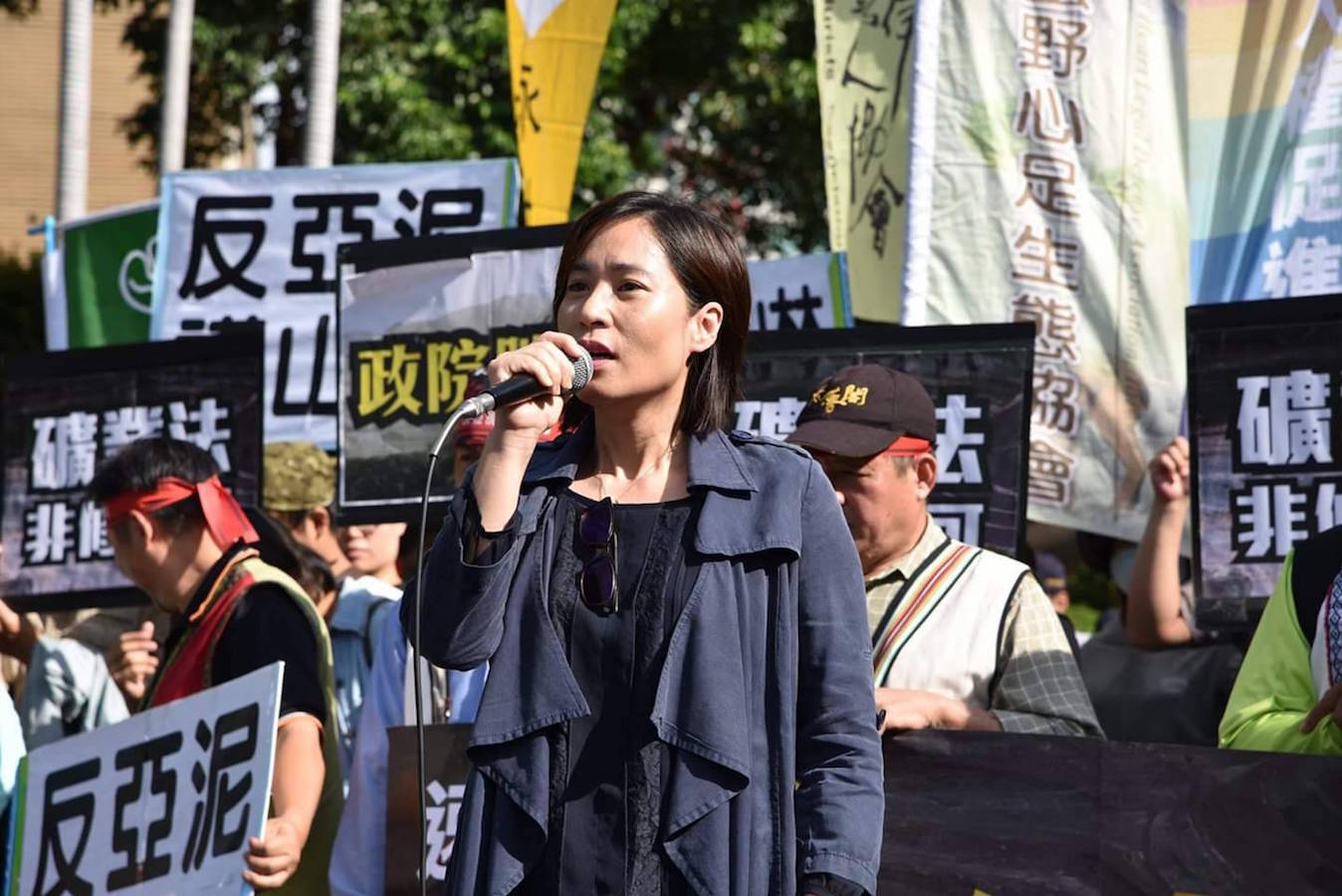 Kawlo Iyun Pacidal. Photo credit: Kawlo Iyun/Facebook
Kawlo Iyun Pacidal. Photo credit: Kawlo Iyun/Facebook
The NPP handed the case over to the disciplinary committee of the Legislative Yuan, which yesterday found Kawlo guilty of a conflict of interest, and decided to relieve Kawlo of her responsibilities as a legislator. The disciplinary committee also recommended the NPP expel Kawlo from the party. Kawlo reportedly refused to answer questions from the committee.
The reason why there likely has not been more discussion of the case within the NPP is because of how fast the case proceeded, with what exactly allegations against Kawlo were remaining unclear for many.
There have, in fact, been similar cases in which individuals in political positions were accused of misappropriating funds for individuals close to them, but largely cleared of wrongdoing. An example would be Taipei Agricultural Products Marketing Company (TAPMC) director being accused Wu Yin-ning being accused of corruption and inappropriate use of promotional funds regarding the possibility she used company funds allocated for promotional purposes to ship unsold vegetables to be donated for lunchboxes in her native Changhua. Wu was accused of attempting to benefit relatives who were local politicians in the area through these actions. However, though Wu was eventually sacked from her position as TAPMC director in part to political pressure from Taipei mayor Ko Wen-je—who is thought to have attacked Wu as an indirect way of attacking the Tsai administration—such accusations of corruption largely glanced off of Wu.
But while the exact details of the scandal remain unclear, the priorities of the NPP were notably on immediately emphasizing that it would pursue the necessary disciplinary action for Kawlo. This may suggest that there is more to the scandal which has not yet emerged publicly, or it simply could have been that the NPP was simply extremely wary of facing charges of corruption—even though this may not have been the most intelligent PR damage control strategy, effectively ceding the political narrative of the scandal to the media immediately.
Much media focus on the scandal have attempted to depict the scandal as a sign of the reversal of fortunes of the NPP, seeing as most of the NPP’s party list candidates are no longer members of the party, and suggesting that this indicates that the NPP will have difficulty finding party-list candidates for the next set of elections. However, membership of political parties is often quite fluid in Taiwan, whether in terms of the DPP, KMT, or other parties. And with the expansion of the NPP in past years, with sixteen city councilor seats won in the last set of elections, it is unthinkable that the NPP will not be able to find legislative candidates. Kawlo was not a locally elected legislator, but a legislator elected by proportional representation who was up for reelection next year anyway.
It is unknown if Kawlo will face charges or seek to contest her expected removal as legislator and expulsion from the party in courts. Either way, the scandal may grow in coming days and weeks as the full details of the case become more clear.
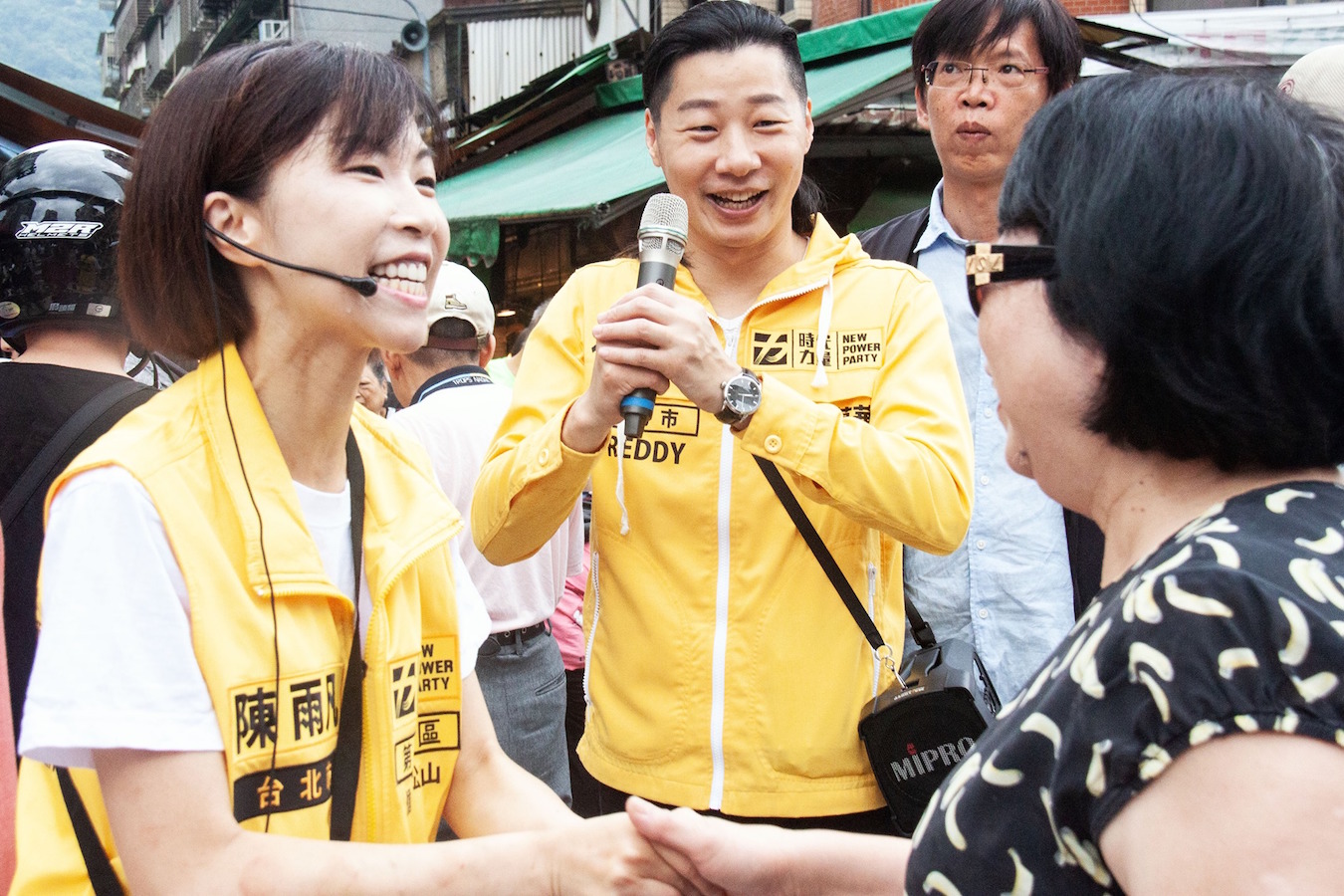 Freddy Lim (center) campaigning with NPP legislative candidate Chen Yu-fan. Photo credit: Freddy Lim/Facebook
Freddy Lim (center) campaigning with NPP legislative candidate Chen Yu-fan. Photo credit: Freddy Lim/Facebook
It is still unknown who the NPP will replace Kawlo with. The more significant damage done to the NPP from the scandal is in terms of political credibility, as well as damage inflicted upon the narrative of the NPP as a rising, growing party through the sudden loss of two legislators between Kawlo being stripped of her status and Lim withdrawing from the party.
Freddy Lim Withdraws from the NPP After Controversy Regarding the Party’s Relation to the DPP
THE SECOND MAJOR scandal facing the NPP, then, concerns what relation the party will adopt toward the DPP in the 2020 elections. This issue has dominated discussion among civil society activists for the past few days,
Namely, former party leader Huang Kuo-chang has suggested that he would potentially leave the party if the NPP becomes a subordinate party to the DPP in 2020 elections, and NPP legislator Hsu Yung-ming suggested that the NPP should consider running a presidential candidate in 2020 elections.
Huang Kuo-chang, who was frequently accused of disproportionately overshadowing the rest of the party, decided not to run for another term as party chair earlier this year, and Handy Chiu instead became the next chair of the party. Yet Huang, who remains a figure strongly associated with the NPP in the public eye, is also increasingly viewed as a loose cannon within the party.
Not only is this due to Huang threatening to withdraw from the party if the party does not comply with his political views regarding the relation that the NPP should take vis-a-vis the DPP, but actions such as independently organizing a rally against “red media” with live streamer Holger Chen. This has proved controversial not only because Huang organized the rally independently of the rest of the party, but because Chen is generally thought of as a pan-Blue leaning figure, though critical of the KMT’s sharp turn toward pro-China policies at the cost of Taiwan’s political freedoms. Rumors also circulate regarding Huang’s personal ambitions, such as that he may be being groomed to replace Taipei mayor Ko Wen-je as Taipei mayor, that he might break away from the NPP to form his own political party with Holger Chen, or that he would join Ko Wen-je’s newly formed political party, the Taiwanese People’s Party, in spite of previous antagonisms with Ko.
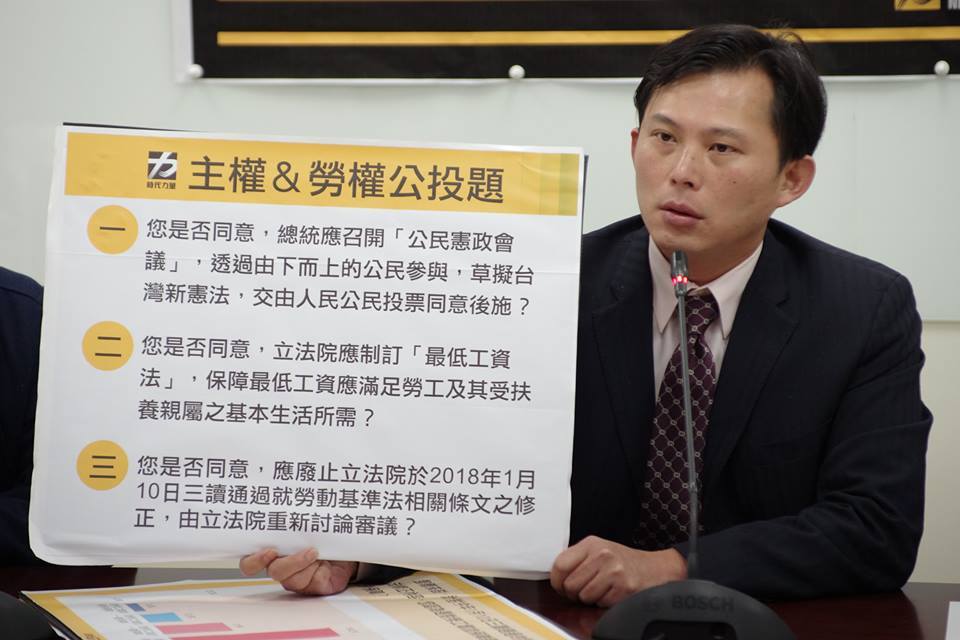 Huang Kuo-chang. Photo credit: Huang Kuo-chang/Facebook
Huang Kuo-chang. Photo credit: Huang Kuo-chang/Facebook
Despite threatening to leave the NPP if the party cooperates with the DPP, it was unusual that Huang seems willing to work with a pan-Blue political figure, leading to accusations that Huang may have shifted political orientations similar to Ko. Huang is also viewed as potentially having endangered Tsai Ing-wen’s election chances by revealing a cigarette smuggling scandal involving National Security Bureau officials that occurred on Tsai’s recent trip to the United States in a highly public manner, perhaps with the deliberate aim of sabotaging relations between the DPP and the NPP.
To this, extent, concerns in the party are also widespread regarding growing factionalism between major party leaders spread across Taiwan, with some suggestions that splits have developed between the NPP’s three locally-elected legislators, in Taipei, New Taipei, and Taichung as well as between party leaders and centers of power in northern, central, and southern Taiwan.
The internal controversy in the party erupted, however, after a 10,000-word open letter on the internal flaws of the NPP was posted by former city councilor candidate Wu Zheng, a prominent former Sunflower Movement activist who was nonetheless unsuccessful in his election 2018 bid in the Songshan-Xinyi district of Taipei.
This would not be the first time that Wu has used social media as a way of sparking public debate within the party. Wu was one of the NPP’s Taipei city councilor candidates that broke with Freddy Lim, who was fronting the NPP’s Taipei city councilor campaign, to side with then chair Huang Kuo-chang in refusing to endorse Taipei mayor Ko Wen-je’s 2018 reelection bid. Ko proved divisive among NPP members because of the fact that he is perceived as having drifted increasingly toward the pan-Blue camp in past years, but he is still viewed as an effective city mayor, leading to one of the first major public splits within the party. Those that endorsed Ko were accused of simply seeking to politically benefit from being endorsed, in turn, by Ko, given his high popularity, but criticisms were that this would prevent NPP members from providing oversight over Ko’s actions as mayor.
Wu Zheng’s 10,000-word open letter regarding the internal dynamics of the NPP
Wu’s essay was generally praised by NPP members and other youth activists for its willingness to publicly open up discussion regarding the future of the party. Much soul-searching has taken place within the NPP, which was formed in the wake of the 2014 Sunflower Movement, about what the relation of the party should be to the DPP after Sunflower Movement student leader Lin Fei-fan chose to take up a position as deputy secretary-general within the DPP rather than join the NPP. The other major student leader of the Sunflower Movement, Chen Wei-ting, currently works for the NPP in Hsinchu. Lin, Chen, and Huang Kuo-chang were popularly seen as the central triumvirate of leaders during the movement.
Namely, the NPP was formed as an independent third party because of the view that the DPP had itself grown corrupt during its years in power and, in this way, not always proven so different from the KMT. But with the KMT seemingly resurgent after nine-in-one elections last year, views are on the rise that pro-Taiwan political parties in the pan-Green camp must ally with each other in order to avoid being wiped out by the KMT.
In the wake of Wu’s open letter, NPP members including Wu, party representatives Wang Yi-kai, Xu Wei-zhan, Zhang Jin-xin, central standing committee member Hsiao Hsin-cheng, city councilors Huang Jie, Meredith Huang, Lin Liang-jun, and others signed a petition expressing support for Tsai, though it is more of a question as to what policy they call for regarding individual DPP politicians. Notably, these are individuals who previously had opposing views regarding what stance the NPP should take toward Taipei mayor Ko Wen-je, as well as individuals with disagreements going back to the Sunflower Movement, but are mainly younger members of the NPP in their twenties and thirties, whereas the NPP’s leadership is generally in its forties.
Lim announcing his withdrawal from the NPP is directly tied to the fallout in the wake of this letter. At the same time as Lim announcing his withdrawal from the NPP, Lim simultaneously announced support for Tsai Ing-wen’s reelection bid and called for all political parties to compete in each district in order to select the strongest candidate to contest the KMT.
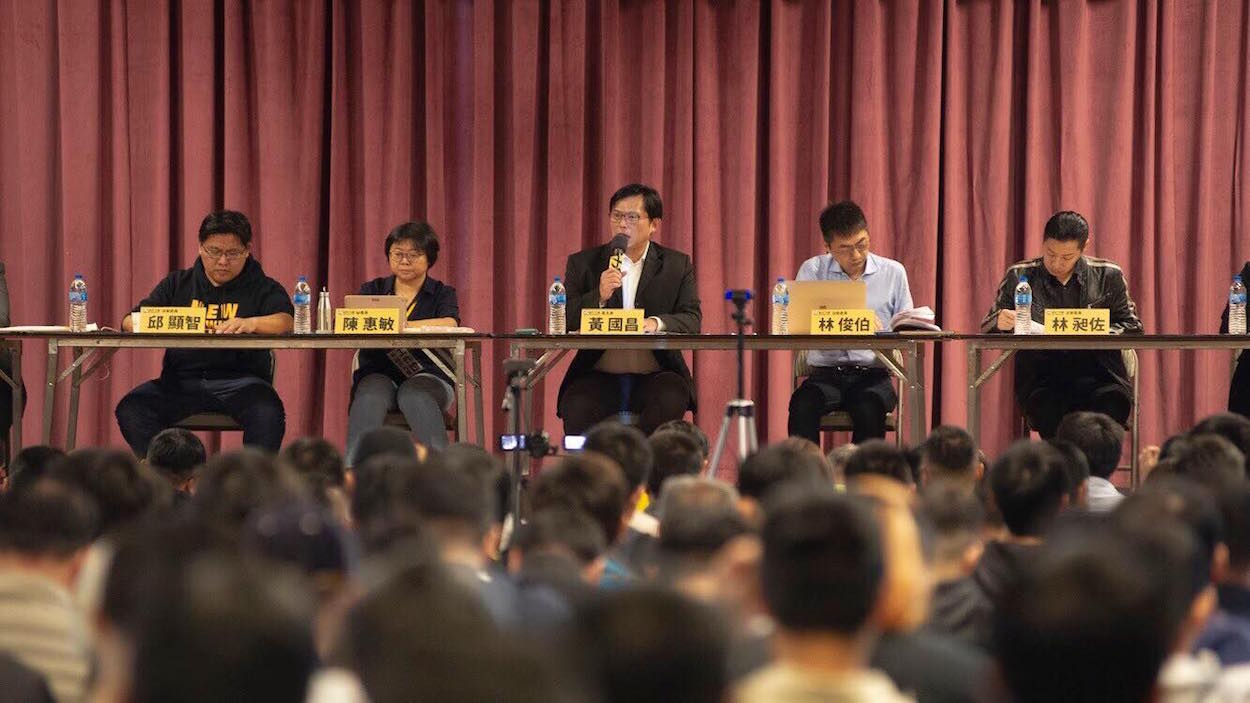 Photo credit: New Power Party/Facebook
Photo credit: New Power Party/Facebook
In the press conference where he made this announcement, Lim stated that Lin Fei-fan had called him immediately after news began to broke about Lim withdrawing from the NPP, but stated that Lin did not try to convince him to join the DPP. Lim stated he would be running as an independent and denied that he would be joining Ko Wen-je’s TPP. The DPP has already announced that it does not intend to run candidates against Freddy Lim or Hung Tzu-yung and may also make way for the Taiwan Statebuilding Party in southern Taiwan. It is still unclear if Lim is, in effect, giving up his de facto endorsement by the DPP in calling for all political parties to compete to select the strongest candidate in any given area.
Lim’s announcement took place after a meeting of the NPP’s central committee earlier that morning in which, based on Lim’s comments, the NPP seemed still unable to arrive at a decision regarding what stance to take regarding its relation with Tsai and the DPP with five months left before elections. In terms of individual party members that Lim expressed disagreement with, Lim primarily spoke about fellow legislator Hung Tzu-yung—an unusual development given that the two have generally been seen as closely aligned. Hung has since stated that she has no plans to leave the party. Lim’s comments only touched briefly on Huang Kuo-chang, with whom Lim is known to have substantial disagreements, but who is currently not a member of the party’s central committee.
The Future of the NPP and the Third Force Is Up in the Air
THE FUTURE OF the NPP as a political party seems to be entirely up in the air, then. The party has rapidly grown in the last four years to become Taiwan’s third-largest party, but questions have always existed about whether the party is one that can grow to challenge the DPP on equal footing, as the self-avowed aims of the party have been, or whether the party will always remain a small party flanking the DPP in line with other third parties in Taiwan.
One notes that many of the issues currently faced by the NPP are, in effect, growing pains. The future direction of the party not only evidence splits between different geographic centers of power in the party, but also generational splits among the party member, issues regarding the departure of the original membership, rising factionalism, and questions about the ability of one party to host multiple political positions within it.
 Freddy Lim. Photo credit: Freddy Lim/Facebook
Freddy Lim. Photo credit: Freddy Lim/Facebook
Such splits are evidence of the growth in membership of the party, not only demographically, but across geographic locations in Taiwan. But if the party is unable to overcome these issues regarding growth, the party will likely never expand beyond a certain level.
With Lim publicly withdrawing from the party, the die is cast. It is possible that others will follow in his wake in departing the NPP. In comments in a press conference after Lim’s withdrawal, party chair Handy Chiu stated rather immediately that he hoped that Huang Kuo-chang would remain in the party. Huang has stated, for now, that he will remain in the party.
If there is an exodus from the NPP, it is of little doubt that some members of the DPP will try to recruit departing NPP members. That being said, some members of the DPP, such as city councilor Wang Hao-yu, a former Green Party member, begrudge the NPP strongly and will likely continue to publicly attack the party, Wang standing out in particular for attacks that sometimes seem to border on spreading false rumors at times.
At heart, the NPP’s current crisis can be traced back to issues regarding whether the NPP can genuinely grow beyond simply being another third party or not. The decision of whether to endorse Tsai Ing-wen or not proves key in determining or whether the party became a fringe ideological third party that continually runs presidential candidates that realistically have no chances of winning, such as pan-Blue New Party and People First Party, or the recently formed pan-Green Formosa Alliance and Chen Shui-Bian’s One Side, One Country Action Party (OSOCAP).
At the same time, the question of whether the NPP becomes a party flanking the DPP hinges upon whether the NPP simply banks on the endorsement of the DPP in order to win, affecting the NPP’s ability to be critical of the DPP and to differentiate itself from the DPP in the eyes of voters. This existential dilemma faces post-Sunflower Movement Third Force parties as a whole.
Taipei city councilor Meredith Huang’s response on Facebook to Lim’s departure from the NPP
Notably, immediately after Lim announcing his withdrawal from the NPP, signatories of the internal petition within the NPP expressing support of Tsai began to call for more individuals to sign the petition, in effect, using Lim’s withdrawal as political ammunition in this call. As many signatories of the petition were recruited into the NPP by Lim, if we do not view Lim as having left the party because he did not get his way, one way of viewing Lim’s withdrawal from the NPP may be to understand Lim as actually sacrificing his position within the party in order to bolster calls from younger NPP members to support Tsai. This would precisely be a means of attempting to prevent the NPP from becoming an ideological fringe party that would seek to contest Tsai.
Either way, one observes a consolidation of social movement actors in past years. Social movement actors previously having been at odds with the NPP leadership during the Sunflower Movement eventually joined the party, most notably Wang Yi-kai. Well-known activists who previously expressed hesitation toward entering the DPP or political parties such as Lin Fei-fan or Aman Wu eventually became DPP members. A degree of flexibility in moving between third parties which have otherwise been at odds with each other can be observed with activists such as former Green Party and former NPP candidate Zeng Po-yu, or NPP city councilor Lin Ying-meng, who was previously associated with the Social Democratic Party though not a member of it before joining the NPP. One imagines a similar phenomenon would occur over time if the NPP were to suddenly dissolve, with current NPP members becoming less opposed to the idea of joining the DPP.
As such, if the NPP were to disintegrate in the upcoming set of elections, it is very likely that a number of NPP politicians would join the DPP, with a gradual decline in their current hostility to joining the DPP. Which is to say, if the NPP were to fade in the wake of its current crisis, it is unlikely that these individuals would fade out of Taiwanese politics entirely—even if the end result was the current NPP being more or less absorbed by the DPP. Otherwise, former NPP politicians might join other Third Force parties or even try to form a new Third Force party, but in the absence of a seismic political shift in Taiwanese politics such as the Sunflower Movement, it would be hard for any Third Force party to have the necessary momentum to grow to the same size as the NPP.
That being said, with Lim calling for all parties to compete to decide who to run against the KMT, primarily citing third parties as he did so, it is also not impossible that the possible fragmentation of the NPP could lead to the re-consolidation of the Third Force under shared auspices—as existed in the form of the Taiwan’s Citizen Union (台灣公民組合) prior to a split between the individuals that later formed the NPP and those that later formed the Social Democratic Party.
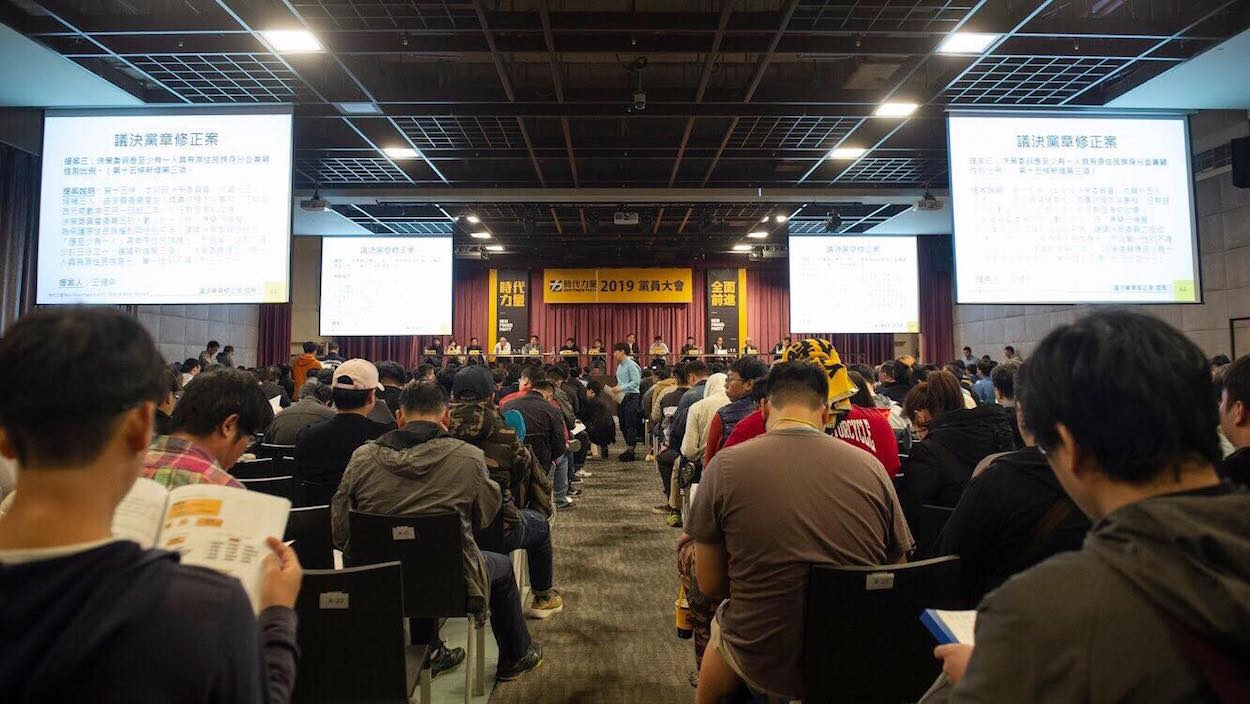 Photo credit: New Power Party/Facebook
Photo credit: New Power Party/Facebook
This will depend on the outcome of debates among Third Force politicians and Taiwanese civil society advocates regarding not only what stance to take toward Tsai Ing-wen, but toward the DPP as a whole. And, again, is important to note that support for Tsai Ing-wen’s reelection bid, to this extent, may not necessarily mean support for DPP politicians or the DPP itself.
Lim’s announcement of withdrawing from the NPP has provoked a sense of crisis, as many were still in shock over Ko Wen-je’s announcement the day prior regarding the formation of the TPP—a move seen as signaling that Ko will attempt to run for president. Concerns had already on the rise that the pan-Green camp would become split due to the formation of the Formosa Alliance and the OSOCAP, and backlash was on the rise against the NPP due to the perception that it could potentially also split the pan-Green vote by refusing to endorse Tsai.
The verdict is still too soon to make on what current events bode for the NPP or for the Third Force as a whole. However, it is clear that large political shifts will take place in the coming days.

